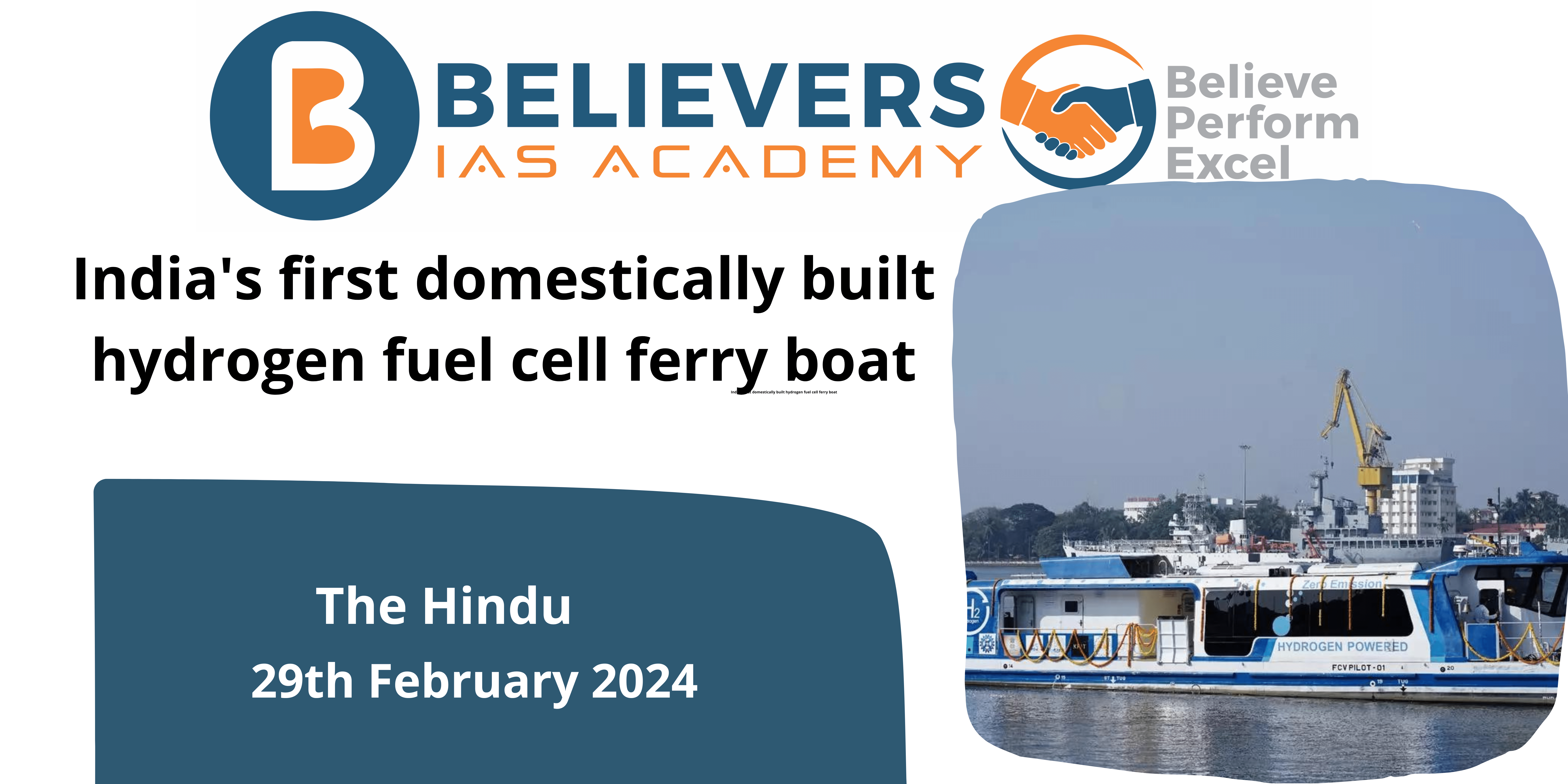India’s first domestically built hydrogen fuel cell ferry boat
Context:
Prime Minister Narendra Modi inaugurated India’s first domestically built hydrogen fuel cell ferry boat, marking a significant step in embracing clean energy solutions.
Relevance:
GS-03 GS-02 (Scientific Innovations & Discoveries) (Government Policies & Interventions)
Key highlights:
- The vessel, constructed at the Cochin Shipyard, is a 24-meter catamaran capable of carrying up to 50 passengers and features fully air-conditioned passenger spaces, enhancing urban mobility.
- The launch event, part of a larger program in Thoothukudi, Tamil Nadu, highlighted the vessel’s role in promoting clean energy and aligning with the nation’s net-zero commitments.
- The hydrogen fuel vessel showcases fully indigenous technology, providing a blueprint for similar projects across the country to improve urban mobility.
- Prime Minister Modi emphasized the significance of various railway projects launched alongside the hydrogen ferry, aimed at enhancing connectivity between southern Tamil Nadu and Kerala.
Vessel Overview:
- The ‘Suchetha’ ferry, powered by hydrogen fuel cells, offers eco-friendly transport for up to 50 passengers.
- Equipped with amenities like air conditioning and comfortable seating, it operates with minimal environmental impact, emitting only water and heat as byproducts.
- With a low draft of 1 meter, it navigates Kochi’s backwaters efficiently, boasting a top speed of 12 knots and enhanced safety features.
Anticipated Benefits:
- Suchetha’s introduction as India’s first hydrogen-powered vessel promises cleaner ferry transport nationwide, particularly in congested urban areas.
- By reducing road congestion and minimizing noise and air pollution, it aims to enhance the quality of urban life.
- The project generates high-skilled employment opportunities and strengthens India’s capabilities in sustainable marine technologies, anticipating cost parity with conventional ferries in the near future.
Hydrogen Fuel Cells:
- Overview: Hydrogen fuel cells serve as a clean, dependable, and efficient source of high-quality electric power, utilizing hydrogen as fuel in an electrochemical process that generates electricity, with only water and heat as byproducts. Given hydrogen’s abundance, it presents a cleaner alternative fuel option.
- Significance:
- Zero Emission Solutions: Recognized as one of the best zero-emission solutions, hydrogen fuel cells emit no tailpipe emissions except for water, making them environmentally friendly.
- Quiet Operation: Their minimal noise output enables deployment in noise-sensitive environments like hospitals, highlighting their versatility.
- Scalability Advantage: Fuel cells offer easier scalability compared to batteries, as doubling the fuel amount doubles operation time, unlike batteries that require component capacity doubling.
- Challenges:
- High Cost: Green hydrogen production, comprising a small fraction of global hydrogen production, is considerably more expensive than conventional grey or brown hydrogen derived from fossil fuels.
- Storage Complexity: The storage and transportation of hydrogen entail greater complexity and additional costs compared to fossil fuels.
- Extraction Process: Extracting hydrogen from water or fossil fuels requires significant energy input, potentially outweighing the energy gained from hydrogen itself, making it costly and energy-intensive. Moreover, reliance on fossil fuels for extraction undermines hydrogen’s green credentials without carbon capture and storage implementation.




